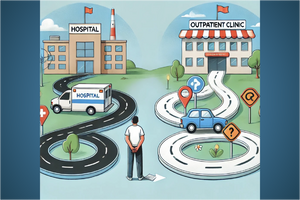
Transitioning from inpatient to outpatient mental healthcare is a critical time for patients. Unfortunately, it’s often marked by significant delays. At the Annual Texas Council of Community Centers conference, it was revealed that the average wait time for a mental healthcare patient to receive outpatient care after discharge is around 30 days. These delays can have serious consequences for patients and the healthcare system.
What Causes the Delays?
Several factors contribute to these delays. Understanding them is the first step to finding solutions.
Systemic Inefficiencies
There’s often a lack of coordination between inpatient and outpatient services. Without a standardized process for scheduling follow-up appointments, gaps in care can occur. Administrative burdens and fragmented healthcare systems make it harder for patients to receive timely and continuous care.
Limited Availability of Services
There’s a shortage of mental health professionals, especially in rural and underserved areas. This shortage means patients often wait weeks or even months for an appointment. High demand far exceeds the supply of providers, creating a bottleneck.
Socioeconomic Barriers:
Many patients face challenges like lack of transportation, financial difficulties, and other social determinants of health. These issues can lead to missed appointments or delays in seeking care, complicating the transition from inpatient to outpatient treatment.
What is Caused by the Delays?
The delays in accessing outpatient mental healthcare can have serious and far-reaching consequences.
Increased Risk of Readmission
Delays in follow-up care can lead to readmission. Timely follow-up within 14 days can reduce readmission rates by up to 20%. Prolonged wait times can cause a deterioration in mental health, necessitating readmission.
Higher Healthcare Costs
Frequent readmissions and extended hospital stays due to inadequate follow-up care contribute to higher healthcare costs. These costs burden both the healthcare system and patients, who may face increased out-of-pocket expenses.
Impact on Patient Well-Being
Timely access to outpatient care is essential for maintaining mental health and overall well-being post-discharge. Delays can worsen symptoms, reduce quality of life, and increase the risk of self-harm or suicide.
The Typical Solutions
Improving the timeliness of outpatient follow-up care is certainly crucial, but typical conversations tend to leave us wanting. What we tend to hear put forward are the following (and we bet you can call out the objections to each):
- Enhanced Coordination: Standardized protocols for scheduling follow-up appointments before discharge can ensure patients have access to outpatient care promptly. Better communication and coordination between inpatient and outpatient providers are key.
Objection: This sounds great, but what time, tools, and resources are we going to use to accomplish it? - Increasing Workforce Capacity: We need more mental health professionals, especially in underserved areas. Initiatives aimed at training and retaining providers, along with leveraging telehealth services, can help bridge the gap.
Objection: More mental health professionals would be phenomenal! But staffing and provider turnover is one of our biggest issues! - Addressing Socioeconomic Barriers: Providing support services like transportation assistance, financial counseling, and community resources can help mitigate the barriers patients face. Integrating these supports into discharge planning can improve access to follow-up care.
Objection: These are great long term goals, but require a major lift that we may not be able to bear right now due to staffing and funding constraints. - Policy and Funding Initiatives: Advocacy for policies that prioritize mental health funding and support for outpatient services is crucial. Increased funding can expand service capacity and improve the overall infrastructure of mental health care.
Objection: Some great strides are being made here, but we are far from the finish line. We need help in the mean time!
The Key? Digitize Your Patient Intake.
Digitizing the patient intake process can be a game-changer in addressing delays. A streamlined, electronic intake system ensures that patient information is accurately and promptly transferred from inpatient to outpatient care providers. This digital transformation reduces administrative burdens, minimizes errors, and speeds up scheduling processes. Digital tools also enable better communication between different care teams, ensuring no critical information is lost. Allowing patients to complete forms and assessments online before their first appointment makes the intake process more efficient and thorough. It also facilitates patient self-scheduling and two-way communication, fostering a proactive approach to care.
How Mend’s Digital Patient Intake Solution Helps
Mend’s Digital Patient Intake solution tackles these issues head-on. Here’s how:
- Immediate Intake: Patients can start their outpatient journey right away, even before they leave the inpatient facility.
- Two-Way Communication: Mend allows for easy, ongoing communication between patients and providers, ensuring that no details fall through the cracks.
- Self-Scheduling: Patients can book their follow-up appointments themselves, making the process quicker and more convenient.
- Digital Forms: Patients can complete important forms like PHQs and GAD-7s online before their first appointment, ensuring that clinicians have all necessary information upfront for personalized and efficient care.
By providing these tools, Mend not only speeds up access to care but also strengthens the relationship between patients and providers. This enhanced relationship builds trust and ensures patients feel supported during their transition from inpatient to outpatient care.
Addressing the delays in outpatient mental healthcare follow-up is essential for improving patient outcomes, reducing healthcare costs, and enhancing the overall quality of life for individuals transitioning from inpatient care. The insights from the recent Texas Council of Community Centers conference highlight the urgency of this issue and the need for systemic improvements. By implementing coordinated strategies and addressing the root causes of delays, we can ensure patients receive the timely care they need to thrive post-discharge.
References: